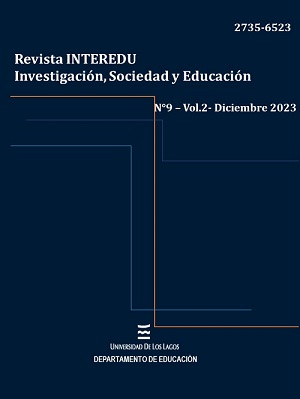Talking to students: a proposal for pedagogical action
Main Article Content
Abstract
Teachers have an important role, because there are teachings that go beyond the presentation of knowledge and connect with a way of being and being in life. The objective of this educational initiative focused on systematizing the implementation of a strategy to promote teacher-student communication in higher education. Methodology: The proposal is ascribed to the principles of the interpretative paradigm, concretized in an introspective-experiential approach. The technique for data collection consisted of an unstructured interview, applied to 21 volunteer students of the Teacher Training Degree in Primary Education, belonging to the Faculty of Education of the María Zambrano Campus in Segovia (Spain). Results: It was observed that participation in the educational experience was a positive experience for the students and favored the classroom environment, stimulating active participation in the classes and contributing to a higher attendance to the subject throughout the academic year of those students who participated in the interview. In addition, the dedication of the teacher was positively highlighted. Conclusion: The educational proposal was well received by the students and had a positive impact on the classroom climate and on the development of the teaching-learning process.
Article Details

This work is licensed under a Creative Commons Attribution-NonCommercial 4.0 International License.
References
Ávila, A. M. (2019). Perfil docente, bienestar y competencias emocionales para la mejora, calidad e innovación de la escuela. Revista Boletín Redipe, 8(5), 131-144. https://doi.org/10.36260/rbr.v8i5.741
Bisquerra, R., y García, E. (2018). La educación emocional requiere formación del profesorado. Participación Educativa, 5(8), 13-28.
Delgado-Benavides, J., y Henríquez-Coronel, M. (2021). Importancia del autocontrol docente frente al rol profesional. Polo del Conocimiento: Revista científico – profesional, 6(4), 153-172.
Extremera, N., Mérida-López, S., Rey, L., y Peláez-Fernández, M. A. (2020). Programa “CRECIENDO” (creando competencias de inteligencia emocional en nuevos docentes): evidencias preliminares y su utilidad percibida en la formación inicial del profesorado de secundaria. Know and Share Psychology, 1(4), 201-210. https://doi.org/10.25115/kasp.v1i4.4340
Finol, M., y Vera, J. l. (2020). Paradigmas, enfoques y métodos de investigación: análisis teórico. Mundo Recursivo: Revista Científica, 3(1), 1-24.
Freire, P. (2004). Pedagogía de la autonomía. Paz e Terra.
García-Vila, E., Sepúlveda-Ruiz, M., y Mayorga-Fernández, M. (2022). Las competencias emocionales del alumnado de los Grados de Maestro/a en Educación Infantil y Primaria: una dimensión esencial en la formación inicial docente. Revista complutense de educación, 33(1), 119-130.
Hiroko, G. (2019). Formación de profesores ante los retos del siglo XXI. Relingüística aplicada, (25), 1-10.
Lázaro, R. (2021). Entrevistas estructuradas, semiestructuradas y libres. análisis de contenido. En J. M. Tejedor (Ed.), Técnicas de investigación cualitativa en el entorno sanitario y sociosanitario (pp. 65-83). Ediciones de la Universidad de Castilla-La Mancha. http://digital.casalini.it/9788490444245
Marín-Suelves, D., Pardo-Baldoví, M., Vidal-Esteve, M., y San Martín-Alonso, A. (2021). Indagación narrativa y construcción de identidades docentes: la reflexión pedagógica como herramienta de formación docente. Revista Electrónica Interuniversitaria de Formación del Profesorado, 24(2), 125-138. https://doi.org/10.6018/reifop.469691
Mera, K. (2019). La sistematización de experiencias como método de investigación para la producción del conocimiento. Rehuso, 4(1), 99-108.
Parra, S. (2019). Aprendiendo desde la emoción. Infancias Imágenes, 18(2), 285-294. https://doi.org/10.14483/16579089.14532
Torrego, L. (Ed.). (2023). Manual de acción para la inclusión: un decálogo para caminar hacia la educación inclusiva. Ediciones Universidad de Valladolid.
Verdugo-Coronel, C. (2021). Educación emocional para un aprendizaje significativo. Dominio de las Ciencias. 7(4), 1054-1063. https://doi.org/10.23857/dc.v7i4.2465
